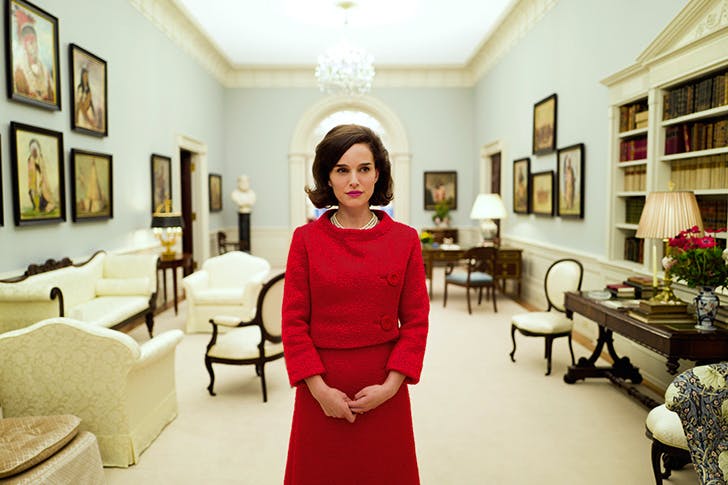Let’s be clear: Jackie is a better performance than it is a film, although I suspect the performance will carry the day, even if that performance is Acting with a capital ‘A’. Was I riveted by Natalie Portman as Jackie Kennedy? I was. She has the look. She has the posture. She has the breathy, Marilyn Monroe-ish voice. But was I aware it was Natalie Portman, Acting? Always. And there isn’t much else here. Jackie never adds up to a whole, or anything near; we don’t penetrate ‘the myth’, and there is no real drama. So it’s disappointing albeit with a small ‘d’ because there are worse disappointments in life, and also the clothes are rather good.
As directed by Pablo Larraín (The Club, Neruda) and written by Noah Oppenheim, the film is not a standard, linear biopic, as standard, linear biopics would appear to have had their day. So there is no chronological processional march as dates fly off calendars and newspapers roll off the presses, which is a bit of a pity, as you always knew where you were with that, and always came away with a sense of a life. Here, the framing device is Jackie giving an interview to a journalist a week after the assassination of her husband, John F. Kennedy, in 1963, and then time spools backwards and forwards as we relive that moment, and the before and after. This is all told through Jackie’s eyes, which is good, and to be welcomed. We like it when no one puts Baby in the corner …but what motivates her?
We first meet her in a house that is large and white but not the White House, as it’s the Kennedy Compound in Massachusetts. It’s only a week after Jack’s death and she’s being interviewed by an unnamed journalist (Billy Crudup) who is, in fact, based on Theodore H. White, the distinguished political journalist and historian who interviewed her for Life magazine on that same day and in that same place, although whether he was as hostile and clumsy as this journalist, I don’t know. My first question was: who would put themselves through this so soon — a week! — after experiencing such a horrific trauma? Jackie, that’s who. But while we understand that she is obsessed with being in control of her image — she has copy approval on whatever the journalist writes — and being in control of ‘my husband’s legacy’, why was that paramount to her? What would it have meant to have lost control? What is she scared of? Where, in short, is any psychological insight? We see what she is, according to this, but never why.
The story loops and spools, spools and loops, often dizzyingly. There are a few stand-out visual moments: the blood-splattered pink Chanel dress; peeling off her blood-splattered tights at the end of the day; scrabbling in the car for that bit of Jack’s skull. But, as the discordant score drones, sometimes deafeningly, the film never gets stuck in, or finds a central narrative with which we might engage. Did she have a happy marriage? Is she a smart woman, or not? No idea. A few other characters bumble about. Peter Sarsgaard, for example, pops up as Bobby Kennedy, while John Hurt plays a priest, and Greta Gerwig plays a social secretary with ridiculous hair. (Greta Badwig?) But it is Portman’s film. She’s at the centre of every frame. And the close-ups, of which there are many, are so close up you can tick off her every pore. She commands your attention, even if that breathiness does become cloying after a while. But she can’t shapeshift like, say, Meryl Streep, who could play a bedside table and make you believe it. You know you are watching The Acting.
Jackie doesn’t come out of this well. Or maybe she does. Hard to know. Her obsession with legacy — she is so determined that Jack will have an Abraham Lincoln-style funeral that she puts her own children’s safety at risk — is her defining trait, if not her only trait. Are we meant to admire this? Sympathise? Where’s any context, so we might decide? And it’s all far too fractured to register on any emotional level. You know I well up at almost anything, right? When she has to tell her children Daddy is dead, there were many dry eyes in the house, my own chief among them.
Ultimately, this just doesn’t add up to anything. Or, if that is too harsh, it’s like being continually offered hors d’oeuvres when what you want is a proper meal.
Still, the clothes are seriously good.
Got something to add? Join the discussion and comment below.
Get 10 issues for just $10
Subscribe to The Spectator Australia today for the next 10 magazine issues, plus full online access, for just $10.














Comments
Don't miss out
Join the conversation with other Spectator Australia readers. Subscribe to leave a comment.
SUBSCRIBEAlready a subscriber? Log in